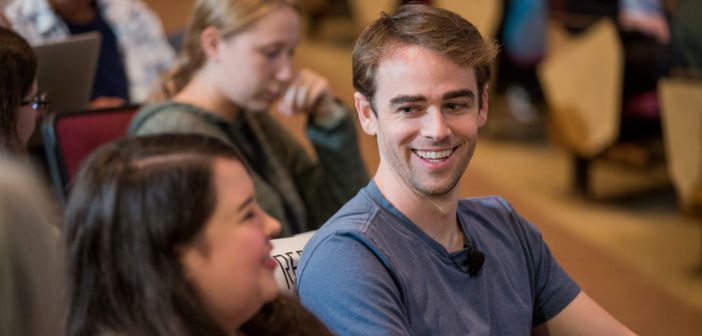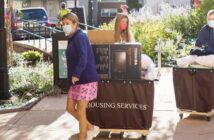Twenty-five-year-old Tyler Shultz made the most significant decision of his professional career to date in 2015. The Stanford graduate, two years out of school, had worked at Theranos, a booming biotech startup, for only eight months before he quit in April 2014.
In that short time, he had learned the truth — that the company founded by Elizabeth Holmes was fraudulent. In October 2015, he blew the whistle.
The story of Shultz, Holmes and Theranos launched Shultz’s speaking tour, bringing him to the third Peter S. Hagerman, ‘61, Lecture in Ethics at Packard 101 on Tuesday, Sept. 24, to recount his role as a whistleblower with Lehigh graduate Gillian Andrews, ‘18G.
“(Shultz) recognized very serious problems at Theranos, and he courageously risked his personal relationships and his professional career to blow the whistle,” said Robin Dillon, a professor of philosophy and the director of the Lehigh University Center for Ethics.
One year later, Tyler Shultz began to work with the company as a summer intern. Despite a cryptic warning from a senior coworker to “work elsewhere,” Tyler Shultz would return to Theranos in September 2013 to begin his career. Shortly after, the red flags began to show.
Theranos produced blood-testing devices that claimed to successfully test for hundreds of diseases. The actual devices, Tyler Shultz said, failed in comparison. The cheaply-made “Edison” devices could not effectively test for any diseases.
“You could get the results in less than four hours, and you could put this device anywhere there was electricity. Medevac Helicopters, battlefields, operating rooms or Walgreens stores. The technology sounded limitless,” Tyler Shultz said. “(But) every single scientist there thought the whole thing was (fake).”
He said company policy encouraged the erasure of data that conflicted with the company’s claims about its product.
Tyler Shultz reached a breaking point when he found the device would not screen properly for syphilis. He said he could not work for a company whose product had fatal implications, and he left. As he left the office on his last day, Holmes phoned Tyler Shultz ‘s grandfather, calling his resignation a vendetta against the company.
When Tyler Shultz chose to speak off-the-record to the Wall Street Journal’s John Carreyrou in 2015, the tension between Tyler Shultz and his grandfather escalated. George Shultz made numerous attempts to have his grandson admit to speaking to the reporter in front of Theranos’ lawyers.
Over the next three years, Tyler Shultz and his family spent over $400,000 battling Theranos in court. Tyler Shultz said he was unaware of whistleblower laws that allowed safer, less financially-taxing methods of action. During that time, he said, he and his legal team were also followed by private investigators. Tyler Shultz was not invited to his grandfather’s 95th birthday, but Holmes was.
“I was really invested in the Theranos story from the beginning and loved the HBO documentary,” said Seanna Corr, ‘20, a bioengineering student on the panel that asked Tyler Shultz questions before the lecture. “I wanted to get a firsthand account of what really happened.”
Now, Holmes faces trial for fraud and conspiracy charges. Theranos, which she started in 2004 after dropping out of Stanford, went bankrupt in September 2018.
Tyler Shultz said he believes the company’s corporate structure, which he assumed was intentionally flawed, allowed its fraudulent activity to continue.
“The ethics behind Theranos are really interesting to me,” student panelist Busara Hall, ‘23, said.
The panel before the lecture included 17 students who were selected by Lehigh’s Center for Ethics. The panel asked Tyler Shultz questions in the Global Commons in Williams Hall.
The students were given the opportunity to ask their own questions about the unethical nature of Theranos, Tyler’ Shultz’s involvement while working at the company and the aftermath of his whistleblowing.
“The employees failed, the board of directors failed, the investors failed, their partners — Walgreens — failed, the regulatory agencies failed,” Tyler Shultz said. “If any one of those groups had really done their jobs, Theranos would not have happened.”






Comment policy
Comments posted to The Brown and White website are reviewed by a moderator before being approved. Incendiary speech or harassing language, including comments targeted at individuals, may be deemed unacceptable and not published. Spam and other soliciting will also be declined.
The Brown and White also reserves the right to not publish entirely anonymous comments.